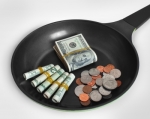 For many people, money and eating go hand-in-hand. So what do you do when you don’t have enough money to eat?
For many people, money and eating go hand-in-hand. So what do you do when you don’t have enough money to eat?
Looking at me, you wouldn’t guess that I wasn’t eating enough food, which I think has a lot to do with my hesitancy to go stand in line for free food. That and pride.
All my life I felt I was fat. However, it wasn’t until I reached my mid-twenties that I actually started to gain weight and keep it. I use food the way an addict of drugs or alcohol use their choice of addiction – to numb the pain.
Today, I’m a very plus size woman so clearly my addiction has been counter-productive. Or has it? I often say that my pain is on the outside for everyone to see. Maybe, maybe not.
Not having enough money to do a simple grocery shop has put a new, and perhaps healthy, twist on my addiction. These days, I get excited if I have enough money to buy milk or fruits and vegetables. These days, my focus is on not being hungry rather than blocking my feelings.
All of my money for the month arrives between the 20 and the 30th, so I have to budget carefully. Once I’ve covered my rent, utilities and necessary bills, whatever money I have left goes towards bus tickets for my daughter to get to schools, laundry (unless I get to do it at a friend’s) and food. This amount can range from $20 to $200 for the month.
Guaranteed food supports have already been put in place for my daughter. She’s on the hot lunch program at her school, free of charge. She can attend a homework club before school to get free breakfast and her school participates in a program which drops off fresh fruit to each classroom weekly.
My options are more limited. The back-to-work program I’m in does have a community kitchen and so the one to three days per week I go there, my breakfast and lunch are covered. Sometimes I get to bring home a container of cream cheese or leftover cookies.
We are also very lucky to have a good friend close by who invites us over to dinner fairly regularly. She only cooks organic and so meals at her place are delicious, nutritious and filling. She has supported me in many other ways, but besides her amazing friendship, having us over for dinner has been a life saver.
Other than that, it’s up to me to provide for my daughter and I the rest of the time, which includes after school snacks, dinners, weekends and whatever other meals we’re not getting elsewhere.
A great month is when I’ve done a big shop at a discount grocery store and stocked up. Then, all I have to buy weekly is produce and maybe dairy. This might happen if I get a GST cheque or other, unexpected money.
In a good month, I can plan healthy meals, shop for the ingredients and not have to worry too much about how much money I’m spending and how much money I have left for the remaining three weeks of the month.
An average month is when I’ve managed to ensure we have bread, milk, cheese, eggs, fruit and vegetables every week. You’d be amazed at how many different recipes you can make with these ingredients.
A bad month consists of quick runs to the local dollar store for pasta or rice, sauce, canned fruits, vegetables, lentils and meat. Sometimes, we can get day-old vegetables for $1 at a local market.
A desperate month involves visits to The Salvation Army, the Food Bank and ‘soup kitchens’. This is a desperate month. So far, I’ve been to the Salvation Army, which you can read about in a previous post “Visiting Sally Ann“, will go to the Food Bank on Monday and hope I have the courage to attend a free dinner at a local church in my neighbourhood on Wednesday.
Have you experience eating with little-to-no money to buy food? How have you coped?
